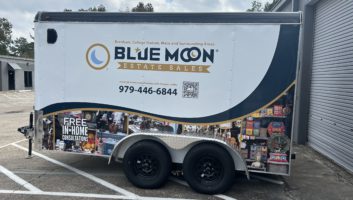

Franchise Marketing Strategies for Consistent Branding and Growth Across Multiple Locations
Franchise marketing is essential for maintaining brand consistency and driving growth across multiple locations. Unlike single-location businesses, franchises operate in diverse markets with unique customer preferences and competitive landscapes. This complexity requires a balanced marketing strategy that ensures a unified brand image while catering to local market needs.
The primary challenge in franchise marketing lies in maintaining brand consistency while adapting to local dynamics. Consistent branding builds recognition and trust, directly impacting customer loyalty and revenue growth. However, franchise businesses face unique obstacles, such as coordinating marketing efforts across regions and managing diverse needs of franchisees and local managers. A comprehensive strategy that combines centralized and localized efforts is vital for overcoming these challenges and driving success across all locations.
Understanding the Franchise Marketing Ecosystem
The franchise marketing ecosystem involves multiple stakeholders, each playing a crucial role in ensuring consistent branding and growth. Key players include franchisors, franchisees, local managers, and marketing teams, each contributing to a cohesive marketing strategy.
- Franchisors: As brand guardians, franchisors set the overall marketing vision and strategy, overseeing brand image and messaging. They provide standardized marketing materials and support to franchisees, ensuring consistency across all locations. Franchisors also manage vendor relationships to maintain high-quality, uniform branding.
- Franchisees: Responsible for local execution, franchisees adapt the franchisor’s strategy to fit their specific market. They implement localized marketing tactics and provide feedback to the franchisors on local market trends and customer preferences.
- Local Managers: Overseeing multiple franchise locations, local managers coordinate marketing efforts at the ground level. They ensure adherence to brand standards and support franchisees in executing local initiatives.
- Marketing Teams: Corporate marketing teams develop high-level strategies and materials, while local teams tailor campaigns to specific markets. Both levels work together to maintain brand consistency and drive growth.
Effective franchise marketing requires collaboration among these stakeholders to ensure a unified strategy that drives brand growth and maintains a consistent customer experience.
Key Strategies for Effective Franchise Marketing
Effective franchise marketing balances centralized control with local flexibility, ensuring consistent branding while catering to diverse market needs. Here’s how to implement key strategies for a cohesive and impactful franchise marketing plan:
Centralized vs. Decentralized Marketing Approaches
- Centralized Marketing (Head Office-Led): This approach provides greater control over brand image and messaging, ensuring uniformity across all locations. Franchisors develop and distribute standardized materials, leading to cost efficiencies and consistent presentation. However, it may lack flexibility for local market nuances, limiting responsiveness to local challenges or opportunities.
- Decentralized Marketing (Franchisee-Led): This strategy empowers franchisees to adapt marketing efforts to local dynamics, fostering creativity and stronger community engagement. While it allows for rapid responses to local trends, it risks inconsistent messaging and quality, potentially leading to a fragmented brand presence.
Many franchises adopt a hybrid approach, combining centralized oversight with decentralized execution. This model maintains brand consistency while enabling franchisees to tailor their marketing to local needs.
Brand Consistency Across Multiple Locations
- Style Guides and Brand Guidelines: Comprehensive style guides outline approved use of logos, colors, fonts, and messaging, ensuring all materials align with the brand’s identity.
- Templates and Pre-Approved Materials: Providing franchisees with templates for social media posts, flyers, and ads helps maintain consistency while allowing localized adjustments.
- Centralized Production and Quality Control: Using a centralized production system for physical materials like vehicle wraps ensures uniform quality and design. For example, Wrapmate’s Preferred Vendor Program (PVP) offers centralized vehicle wrap solutions with consistent standards nationwide.
Local Marketing Tactics
- Localized Content: Creating market-specific content, such as blog posts or social media updates, engages local audiences and builds loyalty.
- Geo-Targeted Ads: Platforms like Google Ads and Facebook enable targeted ads to reach specific local audiences, promoting localized offers and events.
- Community Engagement: Activities like local sponsorships, partnerships, and events enhance visibility and foster customer loyalty within communities.
By combining centralized strategies with local marketing efforts, franchises can achieve a balanced approach that drives growth, maintains brand consistency, and adapts to local market dynamics.
Digital Marketing for Franchises
Digital marketing is vital for franchise success, driving awareness and engagement across multiple locations. Key digital tactics include social media, SEO, PPC, and content marketing, each contributing to a cohesive online strategy.
Role of Digital Marketing in Franchise Operations
Digital platforms offer scalable engagement, measurable results, and data-driven insights, making them ideal for franchises. Tactics include:
- Social Media: Engaging customers through platforms like Facebook, Instagram, and LinkedIn, franchises can build community and drive traffic to locations.
- SEO (Search Engine Optimization): Optimizing websites for relevant keywords improves visibility, attracting more organic traffic and enhancing local search rankings.
- PPC (Pay-Per-Click) Advertising: Targeted ads drive immediate traffic and conversions, promoting local offers and events.
- Content Marketing: Sharing valuable content, such as blog posts and videos, enhances brand value and engages audiences.
Multi-Location SEO Best Practices
- Dedicated Location Pages: Each location should have a webpage with relevant local keywords to improve local search rankings.
- Google Business Profiles: Optimizing profiles with accurate information and customer engagement boosts local SEO.
- Localized Content and Backlinks: Using local keywords and building local backlinks from reputable sites enhance search engine authority.
- Schema Markup: Provides detailed business information to search engines, improving visibility and click-through rates.
Social Media Strategies for Franchises
- Corporate-Level Management: Ensures a unified brand voice and high-quality content across all platforms.
- Local-Level Engagement: Franchisees engage with local communities through location-specific content and promotions.
- Collaborative Content and Advertising: Combining national reach with local engagement strengthens brand presence and customer loyalty.
By integrating digital marketing strategies, franchises can build a robust online presence, driving growth and fostering customer loyalty across locations.
Leveraging Traditional Marketing Channels
While digital marketing is essential, traditional channels like vehicle wraps, out-of-home (OOH) advertising, direct mail, and print advertising also play a critical role in franchise marketing.
Vehicle Wraps and Out-of-Home Advertising
Vehicle wraps turn company vehicles into mobile billboards, enhancing brand visibility wherever they go. This form of advertising combines high visibility with local relevance, making it ideal for franchises. Wrapmate’s PVP provides a centralized solution, ensuring consistent quality and branding nationwide. Additionally, OOH advertising like billboards and transit ads can target specific markets or reinforce national campaigns.
Direct Mail and Print Advertising
Direct mail delivers personalized messages to local audiences, complementing digital efforts. It’s effective for promoting local offers and events. Print ads in local newspapers and magazines enhance visibility and credibility, especially in smaller markets. Integrating traditional and digital marketing efforts, such as combining vehicle wrap campaigns with geo-targeted social media ads, creates a cohesive strategy that maximizes reach and impact.
Traditional marketing channels remain valuable for franchises looking to maintain brand consistency and engage local markets. Combining these methods with digital strategies ensures a comprehensive, omnichannel approach.
Challenges in Franchise Marketing
Franchise marketing involves navigating several challenges to maintain brand integrity, balance local needs with corporate oversight, and manage vendor relationships effectively. Addressing these challenges is crucial for building a strong, cohesive brand presence across multiple locations.
Maintaining Brand Control
Maintaining a consistent brand image across all franchise locations is one of the biggest challenges. With numerous franchisees operating under the same brand, deviations from established guidelines can lead to a fragmented brand image and reduced customer trust. Comprehensive brand guidelines and regular training are essential to ensure all franchisees understand and adhere to brand standards. Additionally, centralized platforms like Wrapmate’s Preferred Vendor Program (PVP) help maintain consistency by providing approved, high-quality marketing materials and services across all locations.
Balancing Local and Corporate Needs
Striking a balance between local autonomy and corporate oversight is another critical challenge. While franchisees are best positioned to tailor marketing efforts to their local markets, too much autonomy can lead to inconsistencies. Conversely, excessive control from corporate can limit local responsiveness and creativity. A hybrid approach, allowing local customization within a centralized framework, helps maintain consistency while enabling franchisees to engage effectively with their communities.
Managing Multiple Vendors and Agencies
Coordinating with multiple vendors and agencies can be complex, often leading to inconsistencies in quality and increased costs. Franchises that rely on local vendors for marketing materials, like vehicle wraps or signage, face variability in standards. Consolidating vendor relationships with a single, nationwide provider like Wrapmate simplifies management, ensures consistent quality, and reduces the potential for errors.
By understanding these challenges and implementing strategies to address them, franchises can build a cohesive marketing strategy that maintains brand integrity, supports local needs, and ensures consistent quality across all locations.
Case Studies: Successful Franchise Marketing Campaigns
Examining real-world examples of successful franchise marketing campaigns can provide valuable insights into effective strategies. Here, we highlight three notable franchises—Mobility City, TruBlue Total House Care, and Fresh Coat Painters—that have partnered with Wrapmate to enhance brand visibility and maintain consistency across multiple locations.
Mobility City: Driving Awareness and Accessibility

Mobility City, a franchise specializing in mobility equipment repair and rental, leveraged vehicle wraps to increase brand visibility. By partnering with Wrapmate, Mobility City ensured consistent branding across all locations.
- Consistent Branding: Wrapmate’s centralized production ensured all vehicle wraps featured the same high-quality design elements, such as the logo, color scheme, and service offerings, reinforcing a professional and trustworthy image.
- Local Adaptation: While maintaining core branding elements, individual franchisees could add localized contact information, allowing them to connect directly with their communities.
- Impact: This campaign effectively combined national branding with local customization, enhancing Mobility City’s visibility and generating local leads.
TruBlue Total House Care: Building Trust Through Visual Consistency

TruBlue Home Service Ally provides home maintenance and senior home modification services. Their partnership with Wrapmate focused on conveying professionalism and reliability.
- Professional Image: Vehicle wraps featured clean, straightforward designs that highlighted key services, reinforcing the brand’s commitment to quality and trust.
- Nationwide Consistency: Using Wrapmate’s network of certified installers, TruBlue maintained high standards across all locations, enhancing brand reputation.
- Localized Engagement: Local contact details on the wraps helped TruBlue franchisees connect with their communities, driving higher conversion rates from local leads.
Fresh Coat Painters: Maximizing Local Impact with Nationwide Reach

Fresh Coat Painters, a residential and commercial painting franchise, needed to stand out in a competitive market.
- Bold Design and Messaging: The vehicle wraps, created in collaboration with Wrapmate, featured vibrant colors and a clear call-to-action, driving customer engagement.
- Consistent Quality: Standardized wraps across all locations ensured a cohesive brand presentation, reinforcing Fresh Coat’s national presence and reliability.
- Local Customization: Wrapmate’s centralized production and quality control allowed for both consistency and local relevance, enhancing brand recognition.
These case studies demonstrate the effectiveness of combining strategic marketing initiatives with high-quality vehicle wraps. By partnering with Wrapmate, franchises can benefit from a streamlined solution that ensures consistent branding while allowing local customization to meet market needs.
Tools and Technologies for Streamlining Franchise Marketing
Leveraging the right tools and technologies is essential for streamlining marketing efforts, maintaining brand consistency, and driving growth across multiple locations. Here are key tools franchises should consider:
CRM Systems
CRM systems centralize customer data, enabling franchises to manage leads and maintain strong customer relationships across all locations. Popular CRMs like Salesforce and HubSpot offer features tailored to franchises, helping them track interactions, segment audiences, and personalize marketing efforts.
Marketing Automation Platforms
Marketing automation platforms, such as Marketo and ActiveCampaign, automate repetitive tasks like email marketing and social media posting. These platforms help franchises execute consistent, high-quality campaigns across all locations, enhancing efficiency and engagement.
Brand Management Tools
Tools like Bynder and Frontify centralize brand assets and automate compliance checks, ensuring all marketing materials adhere to brand guidelines. These tools facilitate collaboration between corporate and local teams, maintaining brand integrity while enabling localized customization.
Project Management and Collaboration Tools
Tools like Asana and Trello support multi-location campaigns, providing a centralized platform for planning, execution, and tracking. They enable real-time collaboration and task automation, helping franchises stay organized and efficient.
By adopting these tools and technologies, franchises can streamline marketing efforts, maintain brand consistency, and drive growth across all locations. Wrapmate’s Preferred Vendor Program (PVP) integrates advanced technology to provide a centralized solution for managing vehicle wraps, ensuring consistent branding and quality.
Measuring and Analyzing Marketing Performance
In franchise marketing, measuring and analyzing performance is crucial for optimizing strategies and achieving business goals. By tracking key performance indicators (KPIs) like customer acquisition cost (CAC) and return on ad spend (ROAS), franchises can refine strategies and improve ROI.
Importance of Tracking KPIs
KPIs like CAC, ROAS, and local market penetration provide insights into marketing effectiveness. Regularly reviewing these metrics helps franchises identify trends, adjust strategies, and maximize ROI.
Using Data Analytics to Refine Strategies
Data analytics enables franchises to segment audiences, conduct A/B testing, and utilize predictive analytics to forecast trends and adjust strategies proactively. This data-driven approach enhances agility and responsiveness to market changes.
Role of Real-Time Data
Real-time data, such as that provided by Wrapmate’s WrapVision technology, allows franchises to monitor vehicle wrap impressions across different markets. This helps optimize campaigns, measure local market impact, and refine branding strategies.
By continuously measuring and analyzing performance, franchises can ensure their strategies are aligned with business goals, driving growth and enhancing customer engagement.
Building a Cohesive Franchise Marketing Strategy
Developing a cohesive marketing strategy is essential for franchises and multi-location businesses. By balancing centralized control with localized flexibility, franchises can maintain brand consistency while engaging effectively with local markets.
Key takeaways include:
- Understand the Franchise Marketing Ecosystem: Aligning stakeholders and understanding their roles is crucial for a unified approach.
- Implement Effective Strategies: Combining centralized oversight with localized execution ensures consistent branding and local relevance.
- Leverage Digital and Traditional Channels: An integrated approach maximizes reach and engagement across all platforms.
- Utilize Tools and Technologies: Adopting the right tools streamlines efforts and maintains brand consistency.
By embracing a balanced strategy, franchises, and multi-location businesses can achieve consistent growth and brand recognition, fostering long-term success.
And, to learn more about Wrapmate’s Preferred Vendor Program for multi-location businesses and franchises, please visit: wrapmate.com/franchise



